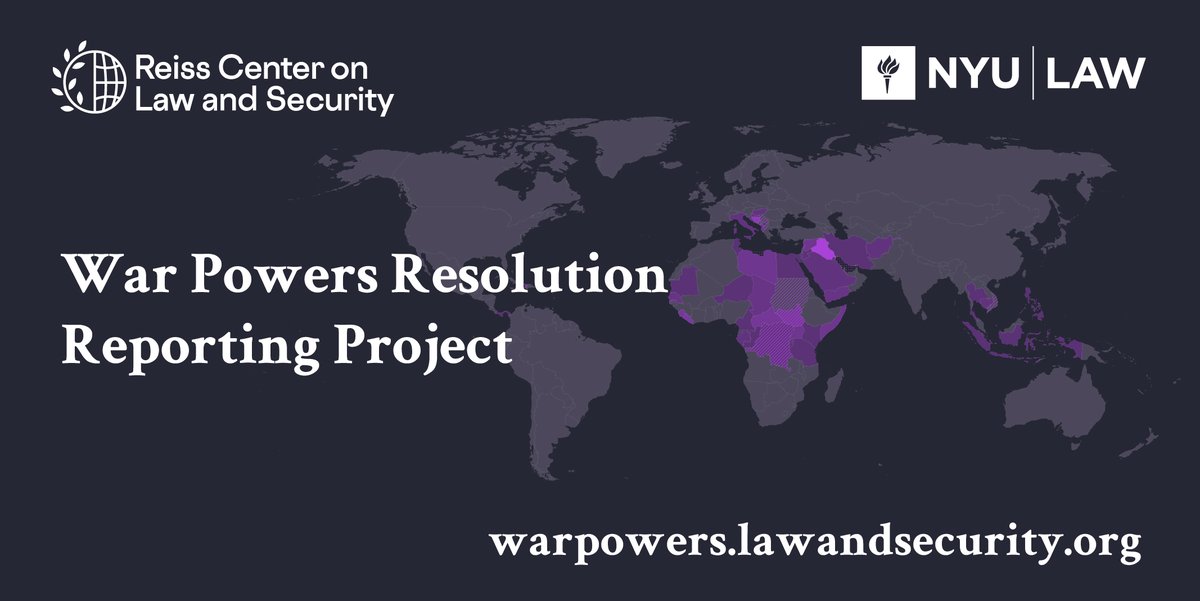
The @Biden admin's 1st strikes are said to be "in response to" recent attacks by "Iranian-backed militant groups" in #Syria.
A few things:
Int'l Legal Basis: I *hope* they mean in self-defense against an imminent threat of armed attack by these groups
defense.gov/Newsroom/Relea…
A few things:
Int'l Legal Basis: I *hope* they mean in self-defense against an imminent threat of armed attack by these groups
defense.gov/Newsroom/Relea…
The use of force is *prohibited* absent a valid claim of self-defense (or UN Security Council authorization, not an option here).
Force cannot be used for deterrence or retaliation.
And force must be *necessary* (in addition to "proportionate" as @DeptofDefense states).
Force cannot be used for deterrence or retaliation.
And force must be *necessary* (in addition to "proportionate" as @DeptofDefense states).
Domestic Law:
The @Biden admin should disavow #Trump-era claims that the #2002AUMF authorizes strikes against #Iran or Iran-backed militias.
But that would mean relying on the President's unilateral Art. II authority for these strikes...
justsecurity.org/67993/why-the-…
The @Biden admin should disavow #Trump-era claims that the #2002AUMF authorizes strikes against #Iran or Iran-backed militias.
But that would mean relying on the President's unilateral Art. II authority for these strikes...
justsecurity.org/67993/why-the-…
As I recently wrote, the #Biden admin needs to make hard decisions about whether to dial back, or at least halt expansion of, expansive claims of unilateral @POTUS authority to use force under Art. II.
justsecurity.org/74903/trumps-w…
justsecurity.org/74903/trumps-w…
.@POTUS committed as a candidate that “the use of force should be our last resort, not our first—used only to defend our vital interests, when the objective is clear and achievable, and with the informed consent of the American people.”
He should explain...
He should explain...
-What other options were ruled out, i.e., was this strike the "last resort"?
-Was there "informed consent of the American people"?
The latter part of this statement can be understood as a proxy for congressional authorization. Seems highly unlikely #Congress had any role here.
-Was there "informed consent of the American people"?
The latter part of this statement can be understood as a proxy for congressional authorization. Seems highly unlikely #Congress had any role here.
Reporting:
We should see a War Powers Resolution report and an Art. 51 letter by tomorrow (required within 48 hours and "immediately").
I hope these are fulsome explanations of the legal and strategic bases for the strikes, not a box-ticking exercise.
We should see a War Powers Resolution report and an Art. 51 letter by tomorrow (required within 48 hours and "immediately").
I hope these are fulsome explanations of the legal and strategic bases for the strikes, not a box-ticking exercise.
It may already be too late to take a step back from the at-best shaky unable-or-unwilling doctrine (for strikes in #Syria) and expansive claims of self-defense (i.e., using force "in response to" recent attacks doesn't say whether they were a necessary exercise of SD).
BUT...
BUT...
This is @Biden's opportunity to set the tone for meaningful transparency in its War Powers and Art. 51 reporting.
Stay tuned for how this fits into War Powers reporting practice from 1973 through Trump, analyzed in our updated @RCLS_NYU database 👇
warpowers.lawandsecurity.org
Stay tuned for how this fits into War Powers reporting practice from 1973 through Trump, analyzed in our updated @RCLS_NYU database 👇
warpowers.lawandsecurity.org
And a shout out to @LorenRaeDeJ for explaining that requests for justification of uses of force are "no burden, but a requirement for the strength of our democracy."
@StephenPomper @AdHaque110 @oonahathaway @ringber @rgoodlaw @steve_vladeck @just_security @RCLS_NYU
@StephenPomper @AdHaque110 @oonahathaway @ringber @rgoodlaw @steve_vladeck @just_security @RCLS_NYU
• • •
Missing some Tweet in this thread? You can try to
force a refresh




